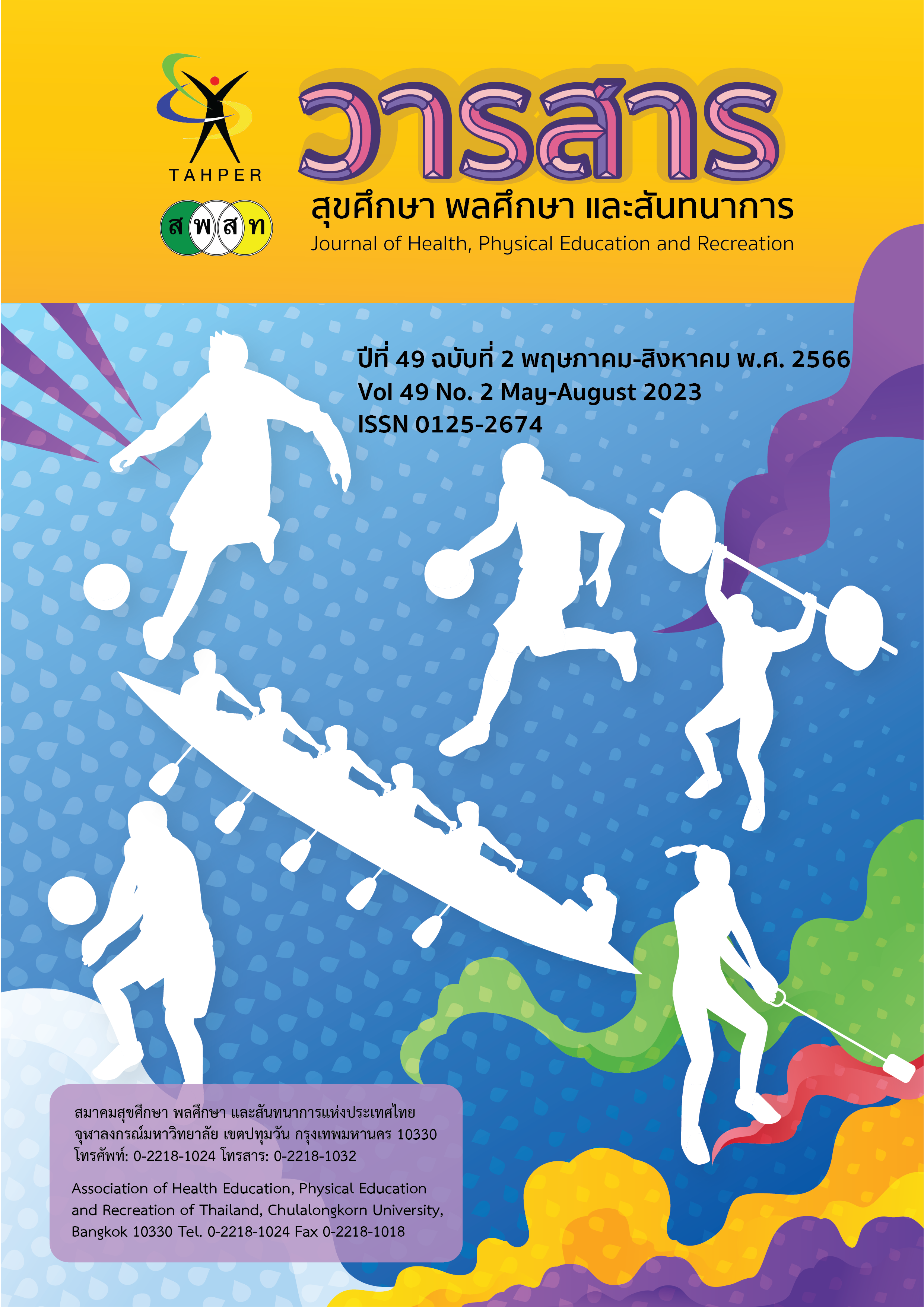The application of folk games affecting motor skills of early childhood children
Main Article Content
Abstract
Introduction: The application of folk play affects the motor skills of preschool children. By practicing folk games, the development of mechanical and cognitive abilities of early childhood children was achieved. Helping early childhood children enjoy independent play. It also allows early childhood children to enjoy playing independently. It also helps instill in children awareness and appreciation of the importance and love of sustainable exercise, which is convenient and cost-effective in organizing movement activities. As a part of social development, it leads to good citizenship, mechanical competence and good learning achievement.
Discussion: Movement is very important and necessary for human beings. Especially in the conditions of human existence in today's society. Principles for organizing basic movement activities must take into account the child and provide opportunities for the child to demonstrate their abilities. Folk games promote children's development in four aspects: physical, emotional-mental, social and intellectual, as well as promoting children's learning experience that meets the needs of children and can help children to adapt to society, which is an important development in life in today's society as well.
Conclusion: The organization of movement activities in early childhood with the application of folk play affected the motor skills of early childhood children. Helps early is suitable for development processes in various fields as part of social development, leading to good citizenship, mechanical competence and good learning achievements.
Article Details

This work is licensed under a Creative Commons Attribution-NonCommercial-NoDerivatives 4.0 International License.
Critical thinking in journals is the right of the author. The Association of Health Education, Physical Education and Recreation of Thailand is not always required, to create diversity in ideas and creativity.
ความคิด ข้อวิพากษ์ในวารสารเป้นสิทธิของผู้เขียน สมาคมสุขศึกษา พลศึกษา และสันทนาการแห่งประเทศไทยไม่จำเป็นต้องเห็นชอบด้วยเสมอไป เพื่อให้เกิดความหลากหลายในความคิดและความสร้างสรรค์
References
จุฑามาศ วงศ์สุวรรณ. (2548). การเคลื่อนไหวประกอบจังหวะที่มีผลต่อประสิทธิภาพในการเคลื่อนไหวของเด็กที่มีผลต่อประสิทธิภาพในการเคลื่อนไหวของเด็กที่มีความบกพร่องทางสติปัญญา (วิทยานิพนธ วิทยาศาสตรมหาบัณฑิต). กรุงเทพฯ: สาขาวิทยาศาสตร์การกีฬา มหาวิทยาลัยศรีนครินทรวิโรฒ.
ณภคกร เจะเลาะ. (2563). การจัดประสบการณ์การเรียนรู้ โดยใช้ชุดกิจกรรมเคลื่อนไหวและจังหวะเพื่อพัฒนา ลักษณะความเป็นผู้นำในเด็กปฐมวัยชั้นอนุบาลปีที่ 3. วารสารเทคโนโลยีและสื่อสารการศึกษา 3,8.
ณัชชา เตชะอาภรณ์ชัย คณะ. (ม.ป.ป.). ผลการจัดกิจกกรมการเคลื่อนไหวประกอบเพลงพื้นเมืองสำหรับเด็กปฐมวัยที่มีต่อความเข้าใจจังหวะ (วิทยานิพนธ์ปริญญามหาบัณฑิต). กรุงเทพฯ: สาขาวิชาดนตรีศึกษา ภาควิชาศิลปะ ดนตรี และนาฏศิลป์ศึกษา คณะครุศาสตร์ จุฬาลงกรณ์มหาวิทยาลัย.
ธีรพงศ์ เจริญนาค ,พิมพา ม่วงศิริธรรม และภานุ กุศลวงศ์ (ม.ป.ป.). ผลของการฝึกการเคลื่อนไหวร่างกายและการเล่นอย่างสร้างสรรค์ที่มีต่อความแม่นยำในการขว้างบอลของเด็กปฐมวัย. วารสารการวัดผลการศึกษา, 37(101).
ฟาลาตี หมาดเต๊ะ. (2557). ผลของการฝึกการละเล่นพื้นบ้านที่มีต่อพัฒนาการของเด็กปฐมวัย. (วิทยานิพนธ์ปริญญามหาบัณฑิต). สงขลา: สาขาหลักสูตรและการสอน มหาวิทยาลัยสงขลานครินทร์.
เยาวรัตน์ รัตนธรรม (2561). การเพิ่มรับรู้ด้านมิติสัมพันธ์ และความใส่ใจของนักเรียนปฐมวัยโดยใช้กิจกรรมเคลื่อนไหวร่างกาย (วิทยานิพนธ์ปริญญามหาบัณฑิต). ชลบุรี: สาขาวิชาการวิจัยและสถิติทางวิทยาการปัญญา วิทยาลัยวิทยาการวิจัยและวิทยาการปัญญา มหาวิทยาลัยบูรพา.
รัฐพล มากพูน (2563). ผลของการจัดการเรียนรู้พลศึกษาด้วยกิจกรรมการละเล่นพื้นบ้านของไทยที่มีต่อสมรรถภาพทางกายเพื่อสุขภาพของนักเรียนชั้นประถมศึกษาปีที่ 5. (วิทยานิพนธ์ปริญญามหาบัณฑิต). สาขาวิชาสุขศึกษาและพลศึกษา คณะพลศึกษา มหาวิทยาลัยศรีนครินทรวิโรฒ.
วิภารัตน์ จอกทองและคณะ. (ม.ป.ป.). การจัดกิจกรรมเคลื่อนไหวและจังหวะ เพื่อพัฒนาความฉลาดทางอารมณ์ของเด็กปฐมวัย. วารสารบัณฑิตศึกษา มหาวิทยาลัยราชภัฎสวนสุนันทา.
วรรณภรณ์ มะลิรัตน์. (2554). ผลการจัดกิจกกรมการเคลื่อนไหวพื้นฐานแบบกลุ่ม ที่มีต่อทักษะทางสังคมของเด็กปฐมวัย (วิทยานิพนธ์ปริญญาการศึกษามหาบัณฑิต). สาขาวิชาการศึกษาปฐมวัย.
Scg badmimton academy (2566). การออกกำลังกายสำหรับเด็กและเยาวชน, สืบค้น 9 มี.ค. 2566, จากhttps://fb.watch/j9eEzZsqpy/?mibextid=qC1gEa


